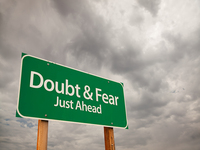 In “6 Ways to Tackle Boring or Irritating Tasks,” the author presents common sense tips for handling unpleasant tasks. I use several of these tips myself. For example, when I have to make a call I don’t want to make, instead of thinking about it or putting it off (and thinking about it) I simply grab the phone and dial the number. By doing it as soon as possible I avoid unnecessary anxiety and I get the job done.
In “6 Ways to Tackle Boring or Irritating Tasks,” the author presents common sense tips for handling unpleasant tasks. I use several of these tips myself. For example, when I have to make a call I don’t want to make, instead of thinking about it or putting it off (and thinking about it) I simply grab the phone and dial the number. By doing it as soon as possible I avoid unnecessary anxiety and I get the job done.
It’s like jumping into a cold swimming pool; the more you think about it, the more anxious you become. Dipping your toes in, trying to acclimate yourself to the change in temperature, often makes things worse (and makes you look like a sissy). Jump in and your anxiety and discomfort will soon be behind you (and you’ll look like a stud).
But while these tips are effective, I’ve found that often, the best way to deal with things you don’t want to do is to not do them at all.
You may disagree. You may believe that life is a series of unpleasant tasks and ignoring them means shirking responsibility, self-sabotage, or squandering opportunity. I’ll admit that this is sometimes true, but most of the time, it isn’t. Here’s why:
- Not everything must be done. I find that not doing things rarely leads to permanent and serious harm or the loss of significant opportunity. The 80/20 principle tells us that “most things don’t matter” (the “trivial many”) and by not doing them, we free ourselves to focus on the “precious few” that do.Ask yourself, “what’s the worst that could happen if this doesn’t get done?” Most of the time the answer will be “not that much” and you can safely cross it off your list.
- Not everything that must be done must be done by you. Just because something needs to be done doesn’t mean you are the one who must do it. Have an employee do it. Or an outside contractor. Or your partner. Whenever possible, do what you are best at and want to do and delegate everything else.
- If it must be done and it must be done by you, it doesn’t always have to be done immediately. How many times have you put something on your task list only to find that out later that it no longer needs to be done? The problem worked itself out, someone else took care of it, or it really wasn’t as important as you previously thought. I find that happening to me all the time. Therefore, by not doing some things immediately, by intentionally procrastinating on things I don’t want to do, I safely eliminate many unpleasant tasks.
- Not everything that must be done, by you, and immediately, must be done completely. The 80/20 principle also tells us that 80 percent of the value of a project, for example, comes from 20% of the tasks that comprise it. Therefore, when you have to do something you don’t want to do, look for ways to curtail it. Do only what is essential and of high value and avoid the rest.
There will always be unpleasant tasks in our lives we must do. A eulogy for a loved one, confronting a child who is going down the wrong path, or creating a household budget to drastically reduce expenses come to mind. But most tasks don’t fall into that category and can be avoided, delegated, deferred or reduced in scope.
The negative feeling you get when facing an unpleasant task are there for a reason. Your aversion to doing something is your subconscious mind (higher self, God, instincts, etc.) trying to protect you.
If you’re staring down a lion and facing death, don’t ignore your fear, run. Do it immediately and as completely as you can. But if you have a call to make, perhaps to a client who is behind in payment, and you don’t want to do it, you don’t have to “feel the fear and do it anyway”. Feel the fear and have your secretary do it.










